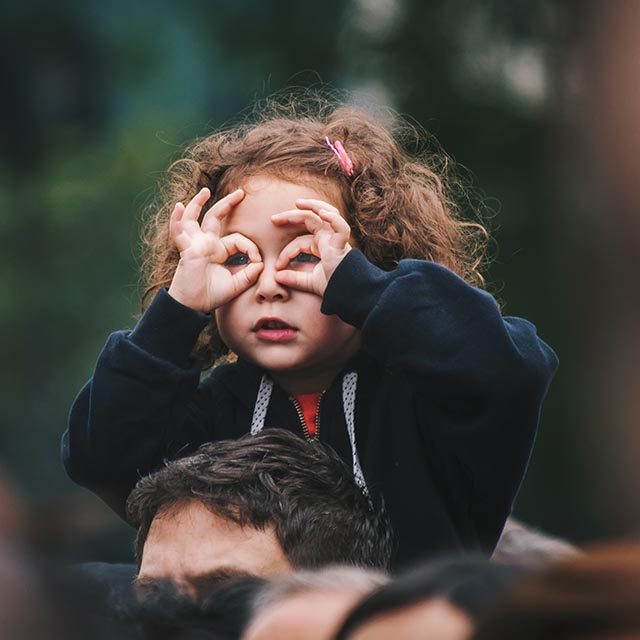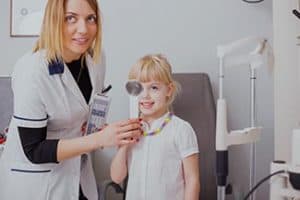Binocular vision assessment is not part of the standard eye test – so what is it and why is it so important?
We are all familiar with an eye test, which measures if you have ‘20/20 sight’ and if you need glasses or contact lenses. But, the eyes are very complex, and deeper and more comprehensive tests can be provided by specific eye doctors.
Binocular vision tests are conducted by certain eye doctors and go beyond the 20/20 sight test.
What is binocular vision?
Binocular vision is the process by which the brain integrates information from a person’s two eyes to generate one clear unified image.
Binocular vision is essential for optimal academic performance.
Binocular vision problems, such as convergence insufficiency, can affect a child’s ability to complete visual tasks in the classroom from an early age.
Lazy eye: Binocular vision dysfunction also affects children with amblyopia (lazy eye) or strabismus (eye turn), as they are unable to use both eyes efficiently as a team.
Head injury: Binocular vision problems can also occur in adults as a result of a concussion or other type of traumatic brain damage, a stroke, or an eye turn caused by nerve palsy.
What are the signs of a binocular vision problem?
Without the ability to easily fuse the images that the two eyes send to the brain into a single image, individuals with a binocular vision dysfunction may experience any of the following:
- Reading or learning difficulties
- Attention or concentration issues
- Double vision
- Headaches
- Eyestrain
- Balance and mobility issues
- Poor hand-eye coordination
A binocular vision assessment is essential if you or your child experiences any of these symptoms.
In people who have had a brain injury, binocular vision dysfunction is part of a group of symptoms known as Post Trauma Vision Syndrome.
It is necessary to first identify binocular vision dysfunction in order to adequately treat it.
Your eye doctor will assess several elements of your vision during this examination, and will advise the best course of treatment.
Schedule a binocular vision assessment with an eye doctor near you.
SEE RELATED: Eye Exams for Children
Why is a binocular vision assessment important?
A binocular vision assessment allows your eye doctor to detect a number of vision issues that might otherwise go unnoticed during a standard eye exam or vision screening.
A binocular vision test will evaluate numerous visual skills that are essential for reading and learning in all students.
These vision conditions include: accommodative dysfunction, binocular vision dysfunction, oculomotor dysfunction, visual perceptual deficits and prolonged visual processing speed.
Learning and most daily tasks, including driving, require the use of visual skills. Undiagnosed vision problems can make it difficult to succeed in school or to utilize one’s eyes comfortably and efficiently at work and in hobbies.
Once a visual skills deficit has been identified, a treatment strategy can be put in place to successfully remove visual roadblocks to success.
Which visual skills are evaluated?
The following visual skills should be evaluated during your binocular vision assessment:
- Fusion
- Convergence
- Working Memory
- Visual Integration
- Visual Perception
- Processing Speed
- Depth Perception (3D)
- Vergence (eye teaming)
- Ocular Posture (resting position)
- Ocular Motility (eye movements)
- Spatial Awareness and Visual Attention
- Accommodation (eye focusing skills)
When is a binocular vision assessment performed?
A binocular vision assessment is necessary when a child is not reaching their potential in school, or while playing sports, or has lazy eye or turned eye.
Parents and/or teachers may notice that the child has trouble reading or concentrating, or is complaining of headaches or other symptoms related to their school grades or attention.
While binocular vision conditions can be successfully treated in both children and adults, it is best to begin treatment as soon as possible. A child’s full potential can be realized with early detection and assistance.
LEARN MORE: Guide to Children’s Eye Exams
Schedule an assessment with an eye doctor near you today!
Binocular vision problems can impact a child’s ability to complete visual tasks in the classroom affecting their reading grades and overall academic performances.
Specific optometrists can assess a child’s binocular vision and provide a range of successful treatment options.








